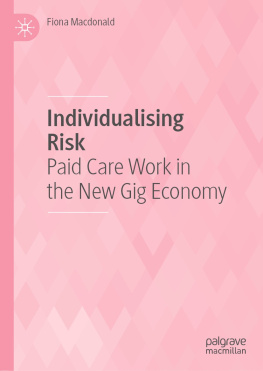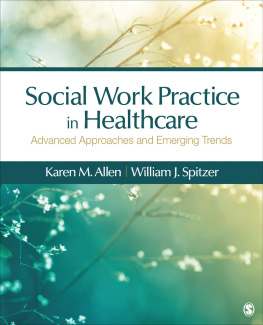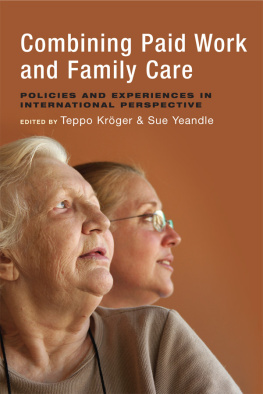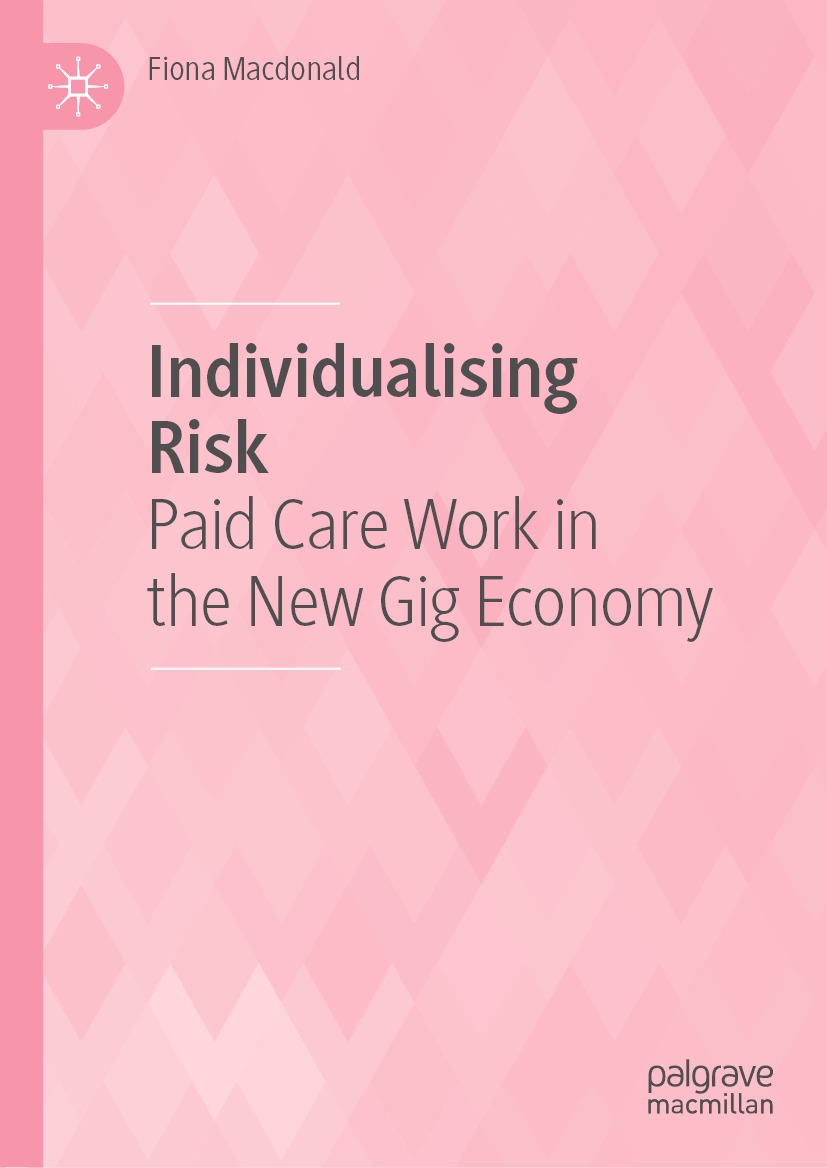Fiona Macdonald
Individualising Risk
Paid Care Work in the New Gig Economy
1st ed. 2021

Logo of the publisher
Fiona Macdonald
RMIT University, Melbourne, VIC, Australia
ISBN 978-981-33-6365-6 e-ISBN 978-981-33-6366-3
https://doi.org/10.1007/978-981-33-6366-3
The Editor(s) (if applicable) and The Author(s), under exclusive license to Springer Nature Singapore Pte Ltd. 2021
This work is subject to copyright. All rights are solely and exclusively licensed by the Publisher, whether the whole or part of the material is concerned, specifically the rights of translation, reprinting, reuse of illustrations, recitation, broadcasting, reproduction on microfilms or in any other physical way, and transmission or information storage and retrieval, electronic adaptation, computer software, or by similar or dissimilar methodology now known or hereafter developed.
The use of general descriptive names, registered names, trademarks, service marks, etc. in this publication does not imply, even in the absence of a specific statement, that such names are exempt from the relevant protective laws and regulations and therefore free for general use.
The publisher, the authors and the editors are safe to assume that the advice and information in this book are believed to be true and accurate at the date of publication. Neither the publisher nor the authors or the editors give a warranty, expressed or implied, with respect to the material contained herein or for any errors or omissions that may have been made. The publisher remains neutral with regard to jurisdictional claims in published maps and institutional affiliations.
This Palgrave Macmillan imprint is published by the registered company Springer Nature Singapore Pte Ltd.
The registered company address is: 152 Beach Road, #21-01/04 Gateway East, Singapore 189721, Singapore
This timely and sobering book shows how the marketisation of social care can go wrong. Fiona Macdonald analyses how Australias new National Disability Insurance Scheme works to shift risk and responsibility to individual support workers at the frontline, to the detriment of the quality of care and support for many people with a disability. Macdonald establishes that labour regulation or the lack of it is as critical as social care policy for shaping how care systems work, and who benefits and loses within them. She also shows how the growing presence of digital platforms in organising disability support work, and their promotion by public authorities, are undermining the conditions for decent work in social care. With important lessons for researchers, policy-makers and practitioners across the full range of social care services, the book raises challenging questions about how social care systems can balance the rights of people who need care and support with the rights of people whose job it is to help them.
Elizabeth Hill, Associate Professor, Department of Political Economy, The University of Sydney
Macdonalds top notch analysis decisively confirms that just when the world is in desperate need of consistent and high quality care, gig work and cash-forcare models are propelling Australia and other countries into a further crisis of substandard, low quality jobs and care. Presenting clear and compelling evidence, Macdonald shows that the marketization of social care results in precarity and further undermines this highly feminized and insecure sector.
Donna Baines, Director and Professor of Social Work, University of British Columbia
This detailed account of the marketisation of social care in Australia provides a sharp analysis of the way in which narratives of cost reduction and consumer choice have worked to stymie the development of decent work for the disability care workforce. Fiona Macdonald shows how the design and implementation of the Australian National Disability Insurance Scheme has failed to include adequate resources for the disability care workforce leaving them vulnerable to some of the lowest paid and insecure working conditions in Australia. The book locates the care workforce at the centre of analysis to provide a critical account of how the interface between care policy and employment regulation produces the conditions of individualised risk for social care workers. Macdonald concludes that a more collective approach to person-centred care based on organisation-based employment for care workers could ameliorate this risk, support high quality disability care support, gender equality, and a sustainable and equitable future of work.
Gabrielle Meagher, Professor Emerita, Macquarie School of Social Sciences
Acknowledgements
I acknowledge, with thanks, the support received from RMIT University through the award of a Vice-Chancellors Senior Research Fellowship and the support from the Australian Research Council. This book was made possible by the contributions of many people. My deep thanks go to Eleanor Bentham whose insights, assistance and company throughout the research process were invaluable. Many thanks are also due to Jenny Malone, Danielle Miller, Mutsumi Karasaki, Karen Douglas, Andrew Nette and Ben Debney and the books reviewers. All helped make this a better book better through their contributions. I appreciate greatly the assistance and patience of the publishing team. My colleagues in the Work of Social Care group, the Centre for People, Organisation and Work and the School of Management at RMIT University have been supportive and encouraging. I am particularly grateful to Sara Charlesworth for her guidance and support. I am immensely grateful to everyone who participated in the research and especially to all the care and support workers who readily offered their time and their personal experiences. My final thanks go to Kevin Brown, who I thank for everything.
The research on which this book is based was funded by Australian Research Council Discovery Early Career Researcher Grant DE160100543.
Contents
The Author(s), under exclusive license to Springer Nature Singapore Pte Ltd. 2021
F. Macdonald Individualising Risk https://doi.org/10.1007/978-981-33-6366-3_1
1. Social Care Work Matters
Fiona Macdonald
(1)
RMIT University, Melbourne, VIC, Australia
Keywords
Gender equality Care work Employment Precarious employment
Introduction
In 2020 the global coronavirus pandemic turned a spotlight on social care workers providing long-term care as, along with healthcare workers, they faced new risks at the frontline of caring for vulnerable members of the community. A largely unnoticed and undervalued workforce, social care workers became the recipients of public expressions of gratitude arising in communities all over the world.
But real recognition of the s ocial care workforce requires more than this. The highly feminised workforce who provide support and care to the aged and people with disability are often low-paid workers in highly precarious employment . Social care workers above all else require fair treatment at work.
This book is about social care workers and how changing social care policies are shaping their work and employment , in interaction with ineffective labour regulation . Its focus is on those policies that personalise or individualise care and what they mean for the well-being, livelihoods and opportunities of the hundreds of thousands of mainly women who perform essential social care work . The book is motivated by my interest in prospects for decent work for paid care workers and my concern that, in individualised social care arrangements, the goal of decent work is becoming harder to reach.








